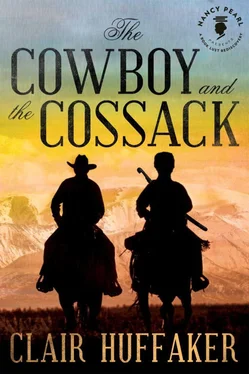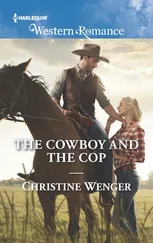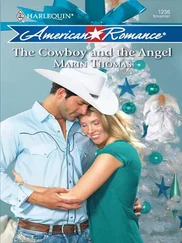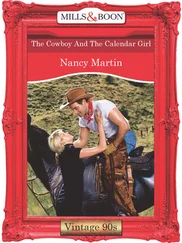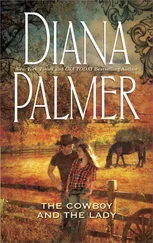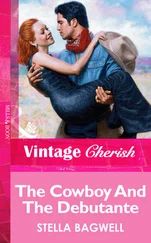The cossacks were impressed as hell with Mushy’s cobbling artistry, so he offered to repair any of their boots that needed work. He must have had requests for nearly thirty pairs to be fixed, all in all.
We were eating on a first-class basis during those good days, too. The cossacks were riding guard far enough out on the flanks to manage to spot and bring down plenty of fresh game. One time they even came in with an impossible animal that they claimed was so rare they had to cook it in their own special way for all of us. The mysterious animal was an antelope, but the damn thing’s thick coat was as pure wool as any sheep who ever walked.
It tasted so good that over supper there was only a halfhearted argument between some of us Slash-Diamonders about whether the strange beast actually was an antelope or a sheep. Chakko finally settled the question by saying flatly, “Eat antelope. Make coat from sheepskin. Fuck it.”
Slim nodded. “That kind a’ common sense sure cuts through all the bullshit.”
“Wish I had that much logic in my chess,” Old Keats said, moving off to where Lieutenant Bruk was now setting up the chess set that he’d hand-carved by himself. The two of them had gotten more and more into the habit of playing really hard at that game whenever they had a chance, and despite his claims to the contrary, Keats was evidently holding his own pretty well.
And then, a few nights later, Mushy finally finished the last pair of boots he had to fix, which belonged to Slim.
“Christ,” Slim said, pulling on the roughouts that Mushy had made like new. “Fine times an’ good boots is about all anybody c’n ever hope t’ want. This here drive’s turnin’ out t’ be a regular goddamn picnic.”
And that just about summed up all of our good, easy feelings.
At least it did until late the next day, when we first saw that big way-off pile of rocks.
Rostov and I were in our normal position ahead of the others, riding far point. For the last few hours the land had been getting rougher, and we were moving into high, rugged hills that stretched brokenly up toward distant mountain peaks.
As he approached the crest of a ridge, Rostov suddenly pulled up and dismounted in one swift, flowing motion. A little behind him, I did the same thing as fast as I could. And then crouching out of sight in the gently waving waist-high grass, we went quickly to the top, Rostov taking out his telescope.
There wasn’t one damn thing moving up ahead of us. And before I’d figured out what we were supposed to be looking at, or even looking for, Rostov lowered his telescope from his eye, then handed it to me.
“The top of the next ridge,” he said grimly.
The ridge was over two miles away, but squinting through the scope I finally made something out. What had looked to my naked eye like one huge, unusually square but natural rock was actually hundreds or maybe thousands of smaller rocks that had been stacked up in the shape of a massive, solid square that was about twenty feet high. And somehow, the fact that the vast, senseless thing was man-made gave it an ugly, spooky feeling.
With a puzzled look, I handed Rostov back his telescope. He raised it once more to silently study the faraway ridge a moment longer, and then he at last stood up, slowly pushing the scope back down into itself to its shortest length. As I stood up too, he spoke again, his voice still grim. “There is no one over there. At least no one living.”
At that distance, even with the telescope, how he could be so sure of himself about no one being over there beat the hell out of me.
We went quickly back down the slope and remounted as Lieutenant Bruk and Sergeant Nick, who must have been wondering what was going on, came galloping swiftly up to us.
The three men spoke briefly in Russian and then Nick spurred back to spread the news, whatever the news was, which nobody had seen fit to bother telling me.
Rostov and Bruk, with me close behind them, now rode up over the nearby crest and moved at a walk out onto the plain leading toward the bunch of piled rocks on the far ridge. Both of them were searching the distance ahead keenly, but there didn’t seem to be any immediate danger. So after a while I couldn’t resist pushing Buck up almost abreast of Rostov and saying with quiet, intense curiosity, “What is it, sir?”
Equally quietly, as though his two words were explaining everything, he said, “An obo. ”
That sure was one hell of an answer, and I was sorely tempted to mention how grateful I was to him for letting me in on all that priceless information. But he suddenly waved the two of us to a stop. Then he lunged his black ahead fifty yards or so through the deep grass to lean down and pick up something that was stuck on a brambly kind of a bush. Finally he raised his arm, signaling that it was alright for us to come on.
When we pulled up near Rostov, he held out his hand for Bruk to see what he’d found. It was nothing but a few long red threads that looked like they’d been torn from a piece of red cloth on the brambles, hardly enough of it altogether to sew a button on a shirt.
Bruk nodded thoughtfully, studying the ground around us, and Rostov said, “They were here before the rains, at least a month ago.”
For some reason or other they both were relieved at finding those threads of cloth, but I was getting more curious and puzzled every minute. So finally I blurted out the first of a number of questions bothering me. “What the goddamn hell, sir, is an obo ?”
Rostov glanced at me with a brief, impatient frown, as though I should have somehow known or guessed the answer. “It’s a Tartar religious symbol.” And then he rode on ahead a short distance, still looking carefully at both the nearby ground and the far distances on each side of us and before us.
More relaxed now, as we walked our horses on across the wide plain, Bruk reached for his long-stemmed clay pipe and started to fill it.
“Damn it,” I muttered, my pride unaccountably hurt because of my ignorance, “how the hell am I supposed t’ know what a goddamned obo is?”
Lighting his pipe, Bruk gave me a quick, keen look. “What would you have guessed it to be?”
“Hell, just t’ look at—a landmark?”
He nodded quietly, as though agreeing with me, but when he spoke he said, “No. If you really look, Levi, every ridge and mountain in our sight can serve as its own landmark. That obo was built as a sacred offering from the Tartars to whatever gods there may be in this area.”
Funny, Bruk talking that way about “really looking.” It reminded me, somehow, of Old Keats telling me way back there on that boat that a man had to see with more than just his eyes. The similar way those two old fellas were in a lot of ways sort of forced a fella to stop and think sometimes.
By now we were halfway across the wide plain. The sun was sinking lower in the west. And the obo ahead of us seemed to grow larger and spookier at about the same slow rate of speed that the sun was sinking.
“How can you an’ the captain be so sure there ain’t no Tartars waitin’ for us up there?” I asked uneasily.
“The birds, even the most timid ones, are flying and landing over there without fear.”
That answer was so simple that I didn’t even dare ask how the threads on that thorny bush meant the Tartars had gone through here a month ago, before the rain. Probably, when it was raining, the goddamned bush sank clear into the ground, or something.
As we got still closer to the ridge with that great pile of rocks on top of it, I just hoped I didn’t sound too much on edge and said, “Dumb bastards! All that work t’ git in good with a bunch a’ gods that ain’t even there!”
Читать дальше
